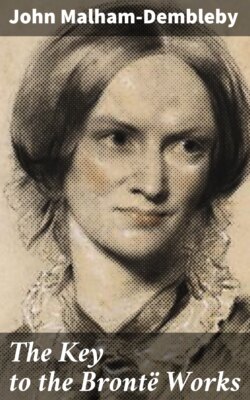Читать книгу The Key to the Brontë Works - John Malham-Dembleby - Страница 16
На сайте Литреса книга снята с продажи.
CHARLOTTE BRONTË'S FRIEND, TABITHA AYKROYD, THE BRONTËS' SERVANT, AS MRS. DEAN OF "WUTHERING HEIGHTS," AND AS BESSIE AND HANNAH OF "JANE EYRE."
ОглавлениеTable of Contents
It is a remarkable fact that of all the members of Charlotte Brontë's home circle the one to whom, excepting herself, she gave most prominence in her works was Tabitha Aykroyd, the Brontës' servant or housekeeper. For I find this good woman was portrayed by Charlotte Brontë as Mrs. Dean of Wuthering Heights, Bessie and Hannah of Jane Eyre, and, on occasion, as Mrs. Pryor of Shirley. Indeed, strange though it may sound to say, my discovery that Tabitha Aykroyd, as she appealed to Currer Bell, was the original of these characters, alone explains the chief mystery of Wuthering Heights, and shows clearly enough Charlotte Brontë was its heroine and its author. In a word, we see by this discovery that Wuthering Heights is book the first of Charlotte Brontë's life as told by herself from old Tabitha's standpoint, and Jane Eyre book the second, giving her life's story and confession as related by herself entirely from her own point of view.
Never in Wuthering Heights did Nelly Dean really understand Catherine, and "the honest but inflexible servant," as Currer Bell calls Tabitha as Hannah of Jane Eyre, never yielded herself to a surrender of her rough-hearted but genuine nature wherein Charlotte was concerned.
"Tabby," said Mrs. Gaskell, "had a Yorkshire keenness of perception into character, and it was not everybody she liked." That Tabitha Aykroyd would readily appeal to Charlotte Brontë as fitted for the narrator of the histories in Wuthering Heights we may easily perceive by reading Mrs. Gaskell's further words on this Brontë servant:—
"When Charlotte was little more than nine years old … an elderly woman of the village came to live as servant at the parsonage. She remained there, as a member of the household, thirty years [Hannah was thirty years with the Rivers family in Jane Eyre—an approximate date, of course, when that work was written] and from the length of her faithful service, and the attachment and respect she inspired is deserving of mention. Tabby was a thorough specimen of a Yorkshire woman of her class, in dialect, in character. She abounded in strong, practical sense and shrewdness. Her words were far from flattering, but she would spare no deeds in the cause of those whom she kindly regarded. She ruled the children pretty sharply; and yet never grudged a little extra trouble to provide them with such small treats as came within her power. In return she claimed to be looked upon as a humble friend. … Tabby had lived in Haworth in the days when the pack-horses went through once a week. … What is more, she had known the 'bottom' or valley in those primitive days when the fairies frequented the margin of the 'beck' on moonlight nights, and had known folk who had seen them. [See references to 'Bessie's' fairy tales in Jane Eyre, Chaps. I., II., and IV.]. … No doubt she had many a tale to tell of bygone days of the countryside: old ways of living, former inhabitants, decayed gentry, who had melted away, and whose places knew them no more; family tragedies and dark superstitious dooms; and in telling these things, without the least consciousness that there might ever be anything requiring to be softened down, would give at full length the bare and simple details."
Says Mrs. Dean, the Yorkshire servant who narrates the family tragedies of Wuthering Heights just after the manner of Tabitha Aykroyd:—
"But, Mr. Lockwood, I forget these tales cannot divert you, … I could have told Heathcliffe's history, all that you need hear, in half-a-dozen words."
"Sit still, Mrs. Dean," cried Lockwood, " … you've done just right to tell the story leisurely. That is the method I like. … Excepting a few provincialisms, … you have no marks of the manners … peculiar to your class; … you have been compelled to cultivate your reflective faculties for want of occasions for frittering your life away in silly trifles."
Mrs. Dean laughed. "I certainly esteem myself a steady, reasonable kind of body," she said; "not exactly from living among the hills and seeing one set of faces, and one series of actions, from year's end to year's end; but I have undergone sharp discipline which has taught me wisdom."
"Jane" says of Mrs. Dean as "Bessie" of Jane Eyre, Chap. IV., Method II., altering the age of characters portrayed:—
